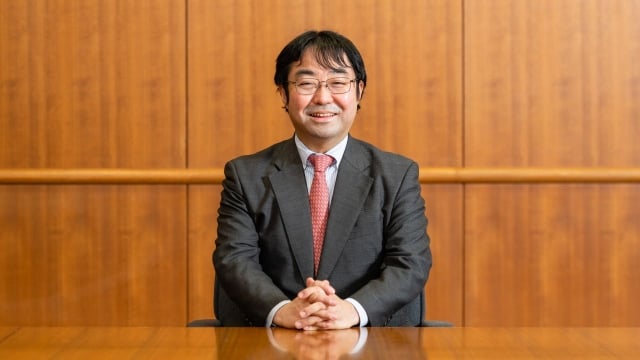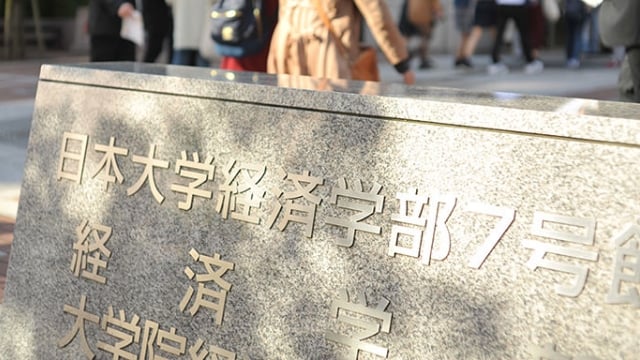Introduction
Experience various sense of values at the Japan’s biggest college of Economics, located in the center of Tokyo. Each day at NUCE leads you the first step of learning.

The Dean
The Dean Koichiro TEZUKA

History of NUCE
Since the establishment in the 37th year of Meiji Period (1904), we have practiced educations to meet the needs of the times.
Exceptional NUCE NumbersCharacteristics
- 6,500
- Students
Japan’s biggest College of Economics
- 6500 Students
- NUCE has around 6,500 students. This is the biggest scale in Japan as a college of economics. This environment gives you the opportunity to meet various senses of values. Throughout college life, you will have precious friends.
- More than
- 100
- Seminars
You can choose
various seminars
- More than 100 Seminars
- The Japan’s biggest college of economics offer you the Japan’s largest numbers of seminars. More than 100 seminars cover society structure, money flow, welfare, environment, local community… You can choose what you are interested from the 2nd year.
- Average
- 20
- Students at Each seminar
Deep and specialized
Small group seminar
- Average 20 Students at Each seminar
- The average number of students at each seminar is 20 per grade. This number realizes deep and small group education. You can study with seniors and teachers in relaxing environments.
- 1.1
- million Alumni
Successful in various areas,
Alumni of Japan University
- 1.1
- million Alumni
Successful in various areas,
Alumni of Japan University
- 22,000
- Presidents
Nihon University has
produced the most
presidents in Japan.
- 22,000 Presidents
- Nihon University has produced presidents of companies in Japan the most. We have kept the 1st place almost 30 years in row on the ranking. Practical study to meet the needs of the times will encourage you to step up in future career.
- 13
- Countries to Study
From Europe to Asia,
Connect to the world
- 13 countries to Study
- NUCE has put focus on studying abroad and international exchange. You can challenge the different type of study-abroad programs at universities in 13 countries, such as the USA, the UK, France, Germany, China, Philippines and so on.
- about
- 200
- Bookstores nearby
The world’s biggest
bookstore area is close to
the campus
- about 200 Bookstores nearby
- A 5 minutes walk to old and new bookstores located in the world’s biggest bookstore area, Kanda Jimbocho. You can find any genres of books, literature, social science, art, there. Also popular cafes and curry restaurants amuse you.
- 5
- minutes to the Nearest stations
JR and Tokyo Metro
Easy access to both
- 5 minutes to the Nearest stations
- The nearest stations are Suidobashi Station on JR Sobu-Chuo line and Jimbocho Station on Tokyo Metro Hanzomon Line and Toei Shinjuku Line. Accessible to many lines within a 5 minutes walk
- 15
- minutes to the Main stations
To Tokyo, Shinjuku Akihabara station
Ideal access
- 15 minutes to the main stations
- From the nearest stations, you can reach the main stations like Tokyo Station, Shinjuku Station, Akihabara Station, Shibuya Station, within 15 minutes. This location is very convenient in many ways, commuting, shopping, travelling and so on.
Since its inception in 1889, Nihon University has been one of the leading research universities in Japan. It started as Nihon Law School in Misaki-cho, Tokyo, and has grown into the single largest Japanese university today, consisting of 16 self-governing colleges, 20 graduate schools and over 70,000 students. Among these colleges, the College of Economics (NUCE) has occupied a central place; its foundation dates back to 1909, which makes us the third oldest college in Nihon University. Together with the College of Law, the school is located in Misaki-cho, where the university started its life. Departments include Economics, Industrial Management, and Finance and Public Economics; and as a school entirely devoted to the study of economics, we have the largest student body and offer the most diverse courses and seminars. Students will also benefit from the courses offered by our International Program in the Department of Economics, where many of the classes are conducted in English.

